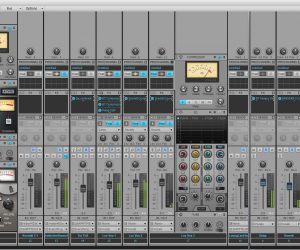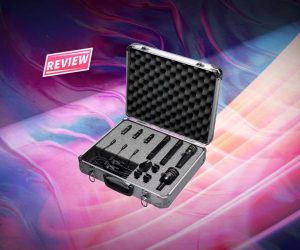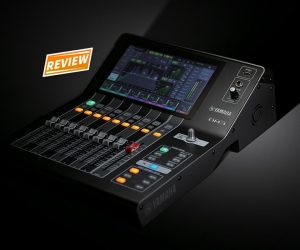
Review: Fender VG Stratocaster
Fender and Roland have joined forces again, this time to produce a Stratocaster with a difference.
It’s not all that often we review a guitar in AudioTechnology – that’s a job best left to the guitar magazines. But every now and then an instrument hits the streets that truly embraces some of the technological advances we’ve all witnessed during the last 10 years or so. DSP modelling is one such field, and an area that ‘serious’ guitarists do their best to steer clear of. But in the last couple of years systems such as Line 6’s Variax range, along with various incarnations of the Roland ‘GK’ standard and the digital Les Paul from Gibson, have infiltrated the ‘wood & steel’ domain.
The big drawcard of these guitars is versatility. I’m not talking about cheesy versatility – like early MIDI guitars being rigged to play marimba or bagpipes – but the ability to emulate real-world guitar tones. That means, the character of a humbucker as opposed to a single-coil pickup; or the twang of a Tele or the quack of a Strat.
Roland has been playing this game since the early ’80s (remember the GR-300 and GR-707?), so it’s hardly surprising to see Roland – now a world leader in guitar synthesis – team up with a world leader in guitar manufacturing, Fender USA. And the obvious choice as to which guitar to get the ‘virtual’ treatment is the ubiquitous Strat(ocaster). The ‘Strat’ is probably the most widely used and copied guitar on the planet, so it’s the immediate choice for retrofitting ancillary electronics (as with the ‘Roland ready’ Strat of a few years back, pre-installed with a Roland GK hexaphonic pickup).
Roland has for a number of years been modelling alternate guitar formats with its VG line of guitar products. Besides offering simulations of amplifiers and speaker cabinets, the VG guitar systems can mimic particular body designs and pickup configurations. These are the style emulations that allow you to get away with using a single guitar, and save you dragging your Strat, Tele, Les Paul, an acoustic and a 12-string to every gig (assuming you own any or all of them).
These are the emulations that have found their way into the VG Strat. But before you jump to conclusions about Roland cramming the guitar with an unwieldy number of sounds and emulations, think again. The VG Strat is extremely simple to operate and offers only a modest 37 sound permutations – all revolving around the guitarist’s mainstay requirements.
AXE EXAM
But first, let’s look at the actual guitar. It’s a standard American series Stratocaster that really is the pick of Fender’s less esoteric models. As opposed to the budget Highway One and Standard series, the American line of Strats feature nice Schaller machine heads, American series staggered pole pickups, two-point tremolo systems and polyurethane body finishes. It’s the one you really want if you’ve got a spare $2.5k to drop on a guitar. And while the VG Strat comes with either a rosewood or maple fretboard, the colour options are limited to black or three-tone sunburst (the sunburst is a tad pricier, as per usual). Fender also supplies American series guitars with a solid moulded case rather than the padded gig bags that arrive with the lower-priced models. They’re a very nice guitar and well worth the extra lolly if you can stretch your budget.
The VG model up for review possessed an extremely nice maple neck, which for me is the ultimate neck – standard headstock design of course! The body, however, (black in this case) looked as though it hadn’t been sanded correctly. My guess is this is why it was dobbed in as the sacrificial lamb ‘demo model’.
VIRTUALITY
The ‘VG’ elements of the VG Strat aren’t immediately obvious. The Roland pickup is discreetly built in between the bridge pickup and the bridge, and sports an equally discreet Roland insignia. Slightly more obvious are the two mini Strat-style knobs that replace the guitar’s usual second tone control knob. The only other distinguishing feature you’ll notice (and you will notice it) is the alarmingly bright blue LED situated between the remaining tone control and the volume knob. The system activates (switches on) as soon as you plug a lead into the guitar – that’s right, there are no proprietary cables or hookup procedures. Just plug in with a normal guitar lead and go. Power is supplied via four AA batteries that live in a recess on the rear in the body, behind the upper horn.
There’s no provision for powering the guitar via AC power, which keeps the concept simple to operate and negates the need for extra cables. Some may wish for an external power source but for ease of use I believe Fender has done the right thing here – the priority being simplicity and usability. A set of Ni-Mh rechargeables should give you about 10 hours of use, but keeping an extra set on hand would obviously be a sensible move. (The blue LED will begin to flash when the batteries are nearing the end of their charge.) The batteries fit into a caddy before being inserted into the rear cavity – it’d actually be a smart move for Fender to supply a couple of these battery caddies so you could have a set on standby for immediate replacement in a gig situation.
DATING A MODEL
Modelling different guitar sounds is what the VG Strat lives for, so what sounds are actually available? Here the partnership has kept the choices to a minimum, which keeps the instrument inherently simple to drive. All sounds are selected via the two mini-Strat knobs; one is marked ‘M’, for model, the other marked ‘T’ for tuning. The Model knob offers five choices: ‘N’ provides normal operation via the guitar’s normal magnetic pickups. In this mode you’ve got a straight-up Strat, which is incidentally what the instrument reverts to should the batteries fail. The following ‘S’ position offers a modelled Strat sound (modelled on an ash body). This may seem ludicrous considering that’s already what’s in your hands, but the modelled Strat option offers attributes such as hum and noise-free operation on all pickup settings, and the sound is slightly warmer and fuller than the ‘normal’ tone gleaned from the magnetic pickups. The following ‘T’ setting is, of course, for Telecaster tones and here the five-way switch functions in only three positions to give you the bridge, neck and ‘both’ sounds of the Telecaster. It does a darn good impression with the bridge pickup emulation being the better model of the three – surely that’s what the Tele is all about anyway. The fourth setting (labelled ‘H’) emulates two humbucker pickups, again with the blade switch flicking between bridge, neck and ‘both’ positions. These definitely offer what you’d expect: full, round tone along with the higher output gleaned from the humbucker designs. The final model setting is labelled ‘A’ and takes the VG Strat into ‘acoustic’ mode, offering five acoustic emulation settings, depending on the position of the Strat’s blade switch. In ‘Acoustic’ mode the tone control becomes reverb level and with this knob wound out to ‘10’ it’s a tasteful amount of reverb, rather than 100% wet. Of the five settings, one is definitely a resonator body, while the others appear to be variations on a typical dreadnought. To be honest I couldn’t tell precisely – there’s certainly no mention in the manual – they’re simply referred to as ‘Acoustic 1–5’.
SWEET TUNE
The second mini-Strat knob alters the VG Strat’s tuning. Predictably labelled ‘T’, the knob switches through six tuning variations. Normal – where there’s obviously no pitch-shifting going on – through to open tunings like dropped D, open G (D G D G B D), D modal (D A D G A D) and baritone (B E A D F# B). The final tune setting delivers a 12-string effect that’s really very authentic. Not being so well versed in open-tunings, I found myself scurrying around looking for my copy of Brendan Gallagher’s Open Tuning Chord Book – thoroughly worth its weight.
I know that with all of these settings, the words ‘pitch’ and ‘shifting’ can tend to make a guitar player squirm, but this modelling effect is particularly convincing. Bear in mind, the tune effects are being constructed via the six individual pickups within the Roland pickup, so processing is applied to each string (monophonically) rather than the entire signal. The tuning settings will certainly strike a chord (apologies) with the covers band fraternity and slide players. And while you do hear the occasional artefact, the sound is very convincing, even down to 12-string with a bit of tremolo work – wild indeed.
VG OR NOT VG?
One aspect of the Fender VG Strat that did annoy me was the absence of a 13-pin plug for connection to anything VG or GK from Roland and other manufacturers. I realise this is meant to be a simple-to-use VG system, catering to players leaning more to the traditional side of things, but the GK pickup is already in the guitar, so why is there no way to plug this into a Roland VG system?
Curiosity getting the better of me at this point, I removed the aluminium plate from the rear of the body – this routed section contains the processing hardware behind the modelling system. Lo and behold there was a spare connector on the internals situated right beside the connection to the cabling for the Roland pickup. Now I’m merely speculating, but could there be a future option to possibly replace the rear backplate with one that could house a low-profile 13-pin plug? It’d be nice to think so. After all, the VG Strat is a good $1700 more than the standard American Strat and for that kind of cash, adopters of the VG Strat may well wish to delve deeper into the possibilities of Roland’s modelling technology.
Speculation aside, I’m largely impressed with the VG Strat. For the hard-working gigging musician it saves a load of haulage, and opens up a huge number of possibilities for live performance. In the studio the benefits are several: instantly flitting between the four or five most commonly used guitar sounds being high on my list, while the lack of noise produced by the electronics is just awesome. However, the underlying attraction is just how much fun it is to play. It’s a classic piece of Fender, dragged screaming into the 21st century. It’s suitably convincing for all live work and a godsend for a whole host of recording duties.
















RESPONSES